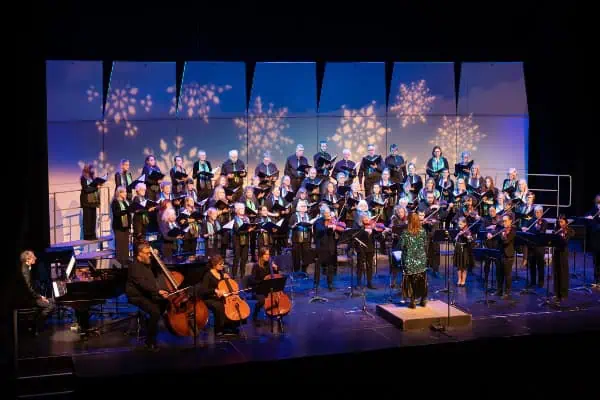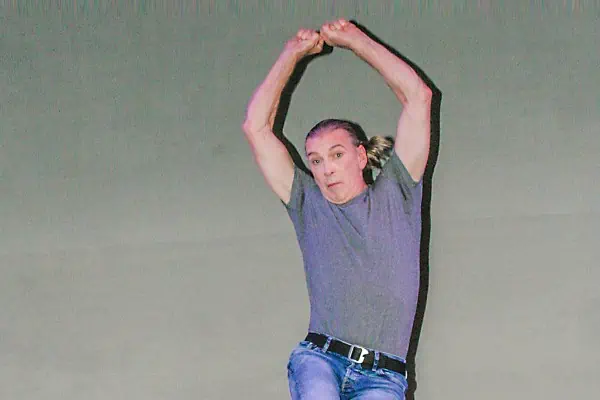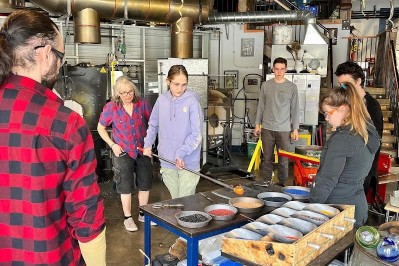What is memory? Where does it live? Where can it take you? Who does it belong to? What is it like to live without it?
These are some of the questions at the heart of Broken, a new play by Whitehorse theatre maker Brian Fidler that opened this week in as a Nakai Ramshackle Theatre co-production.
“The origins of Broken come from my own personal history of having experience with a grandparent with Alzheimer’s disease,” Fidler explains.
“So that’s where it began, but it very quickly moved away from that personal story and I’d like to think has moved into the territory of a more universal story.”
In the one-person show, Fidler plays William, a young man who is helping his parents move out of their home and comes across a box of his grandfather’s effects, including a number of photographic slides.
“When William was a boy, their favourite pastime was to have slide shows,” Fidler says.
As he goes through the slides, they trigger reminiscences the actor shares with the audience through the eyes of the grandfather, and those of William as an adult and as a boy.
“Reminiscence is probably not the right word at all, because reminiscence is sort of a passive kind of word for this very active show,” Fidler says.
“We’ve employed many different ways of storytelling and many different ways of re-enacting.”
Director Maiko Bae Yamamoto, who has worked with Fidler at several points during the play’s three-year development process, agrees that the performance is anything but a static display of images and objects from the past.
“When the character William interacts with these objects, it sets him off on a whirlwind of memory and he kind of gets pulled into these different states, and that’s kind of the pathway to the storytelling,” Yamamoto says.
“It’s very active. It’s activated through the objects, so it doesn’t feel static at all.”
“I’ve really taken great pains to embody the younger version of myself, the childhood version,” Fidler adds.
“I’ve got a lot of personal photos in the show; I went through all my albums, and so there are some pictures of me when I was nine years old that I’m really attempting to channel directly. I’m just trying to graft some of my younger skin onto my own face.”
William’s intention in reconstructing the events and feelings the slides and other objects in the box evoke is not to help his grandfather retrieve lost memories.
It’s too late for that. The grandfather is already dead.
“In William’s trajectory, he is attached both to his grandfather and his parents, and also to his new family and his own children,” Yamamoto says.
That reality, she explains, forms the heart of the play’s timeline.
“Every time he is reconstructing a memory, the intention is so that he can change something about himself, or hold onto something that is going to be useful for his kids. So, as much as he’s moving backward in time, he’s also moving forward in time.”
Yamamoto refers to Fidler’s process of theatre making as “kind of a found-objects puppetry”, but quickly qualifies that expression.
“When you say puppetry, people instantly start thinking about the Muppet Show, but Brian just interacts with each object, and each one triggers something. The way he handles them, they have a real life and a real presence.”
The Vancouver-based director’s own company specializes in creating new work, so she wasn’t fazed by the prospect of directing someone who was not only the playwright and the performer, but also a director in his own right.
“Brian’s pretty tough-skinned, and he’s made himself really available to the process,” she says.
Having someone else calling the shots also suited Fidler.
“It was definitely a relief to sort of let go of imagining myself doing absolutely everything, and turning the reins over to someone else and just being the performer,” he says.
Still, there were times in the final rehearsal stage when being the author made things difficult for him as a performer.
“I was having trouble just memorizing it and not being the writer anymore. I’d start with a clean page of text and in trying to memorize it, I’d just end up with edits all over the page, and never get anyplace with the memorizing,” he admits.
“After about three days, Maiko just said, ‘Now you have to put your pen aside and trust that the script you’ve written is the right script. You’ve written those things for a reason, so now it’s time to memorize it.'”
Fidler says audiences needn’t fear that the play about memory and dementia will be a “super-downer”.
“We’re not pulling any punches, but it’s not going to scar you.”
In fact, he hopes the subject matter will make Broken a suitable candidate for touring after the Whitehorse run.
“I think the interest is out there in the conversation about aging, memory and Alzheimer’s. So I think it’s topical. I definitely have dreams that it is a good touring show, and I have to take those steps after we do this initial production.”
Broken runs September 5-8 and 11-15 at the Yukon Arts Centre studio theatre.



